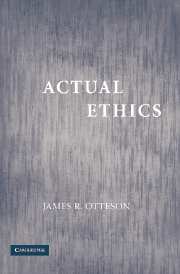Book contents
- Frontmatter
- Contents
- Acknowledgments
- Preface
- PART I WORKING OUT THE POSITION
- 1 Personhood and Judgment
- 2 A Matter of Principle, Part One: The Betrayal of Personhood
- 3 A Matter of Principle, Part Two: Personhood Writ Large
- 4 The Demands of Poverty
- 5 The Wealth of Nations
- PART II APPLYING THE PRINCIPLES
- PART III THE END
- Index
- References
4 - The Demands of Poverty
Published online by Cambridge University Press: 17 November 2009
- Frontmatter
- Contents
- Acknowledgments
- Preface
- PART I WORKING OUT THE POSITION
- 1 Personhood and Judgment
- 2 A Matter of Principle, Part One: The Betrayal of Personhood
- 3 A Matter of Principle, Part Two: Personhood Writ Large
- 4 The Demands of Poverty
- 5 The Wealth of Nations
- PART II APPLYING THE PRINCIPLES
- PART III THE END
- Index
- References
Summary
I argued in chapters 2 and 3 that only the limited, “classical liberal” state is consistent with respecting people's personhood. In that way I claimed to have made a “principled” case: because respecting personhood is the bedrock moral principle, disrespecting it is wrong regardless of other considerations. At the end of chapter 3, however, I suggested that the argument left one central question as yet unaddressed: What about the poor? I argued that respect for personhood meant allowing only social, not political, power to be employed to help others. But perhaps restricting the state so that it secures and enforces ‘justice’ will benefit only those who already have (substantial?) private property. Again, where does it leave the poor? What exactly is our obligation to give to those who have less than we? If the poor suffer unduly under the classical liberal state, perhaps “general welfare” ought to supersede or trump the “principled” case made earlier.
I propose to tackle this cluster of questions in two ways. First I examine philosopher Peter Singer's influential argument about our moral duty of famine relief. Singer argues that wealthy people in the West are morally obligated to give a large portion of their money to poor people elsewhere in the world, and the reach of the obligation Singer presses is surprisingly extensive. The influence of the Singerian argument warrants scrutinizing it closely, which we will accordingly do to see what we can make of it.
- Type
- Chapter
- Information
- Actual Ethics , pp. 129 - 158Publisher: Cambridge University PressPrint publication year: 2006



